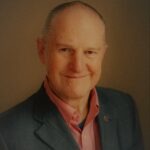Courting the Sandman

MIRELLA lay still in her bed, though she felt every muscle twitching. She had tried tossing but could not get comfortable. Lying on her back, she scooted up to rest her head on the pillow. She had read somewhere that in colonial times, they used to sleep almost sitting up. The standby light on the computer stared at her accusingly. A blinking blue light on the modem rose from behind her dresser, throwing shadows from the pictures across the walls and onto the ceiling before vanishing in darkness for another second.
She had dozed, but every time she realized she was awake, the blue glow of the alarm clock told her that only ten or twenty minutes had passed. I should be exhausted, she thought. I could hardly move when I got back from the milonga at the club. I was so tired!
Listening to the drone of the air-conditioner, she wondered what she was worried about. Business was good. She had won three new direct clients this month, and, for the first time ever, she had been “forced” to refer clients to Sandro and Agatha, because she was already committed. She had sent estimated taxes on expected profits to the IRS for three quarters now, a milestone in her business plan.
The scare when she thought she missed a period last year was long over. So was Henry; she did not miss him.
Several dozes later, pink fingers reached through the trees outside her window. Soon the sun would blaze through the east-facing window with the promise of another glorious day. Ugh. Already?
***
“I can’t get to sleep.” Who has not had this problem at some time or other? What about poor sleep, when you wake up unrested or reluctant to face the new day? No doubt slogging through the day or dozing at one’s workstation does not enhance productivity. It is easy to blame a host of external factors: job stress, the holidays, the in-laws, the kids, the spouse or the ex, the roommates, the Client from Hell, the deadlines, etc. Very often, the problem is described as “not enough sleep,” even when the quality of the snooze is the problem.
Medical sleep researchers have published an amazing amount of new information in recent years. Some of it has confirmed what our mothers told us; other research has upended familiar assumptions.
I am not a medical doctor, so none of this should be considered medical advice. I am just reporting my own (anecdotal) reactions to the information I obtained. Sometimes, what works for me won’t work for you.
If in addition to your job you are physically active, you have more reason to get a good night’s sleep. Riding a bicycle, hiking, or just enduring a long drive takes a physical toll. And physical activity, especially an endurance activity like long range riding or running, absolutely requires the best recovery conditions possible.
It turns out that there is more to interfere with sleep than just a shortage of time. You may have heard that one needs eight hours of sleep each night. Well, it’s not that simple.
We don’t need a certain number of hours; we need a certain number of complete sleep cycles. Each sleep cycle has four phases:
- A light phase, where we seem to fall asleep deeply, but we can wake up from it rather refreshed. This is why a short nap (20 minutes?) is better than a cup of coffee when I am forced to work and get too tired.
- A deeper phase, during which the body begins to recover and manufactures the melatonin needed for the third phase.
- This is the deepest phase, during which the most important repair and recovery takes place. This is when the body rebuilds muscles, resets stressed nerves and otherwise deals with the physical, mental and emotional stresses of the day. Darkness and melatonin are essential for this phase. It is also the worst phase from which to be awakened. Unrepaired bodies wear out (age) faster, so this sleep phase is critical for long-term health, even when we are young.
- A light phase, during which dreaming may take place, just before waking. Also called REM, for the rapid eye movement that characterizes this phase.
Some things I learned in the Navy about night vision became important when I began studying sleep. Night vision is essential for seeing where you are going at sea, because there are no streetlights or headlights. At night, all lights are out on deck except legally required running lights, which are shielded so we can’t see them from the ship. To protect our night vision, all lights inside the ship are set to red; flashlights have red filters on them, and only certain rooms, away from sleeping or working compartments, have white lights.
I have learned that white and blue light halt the production of melatonin. There is a relationship between the sun rising and waking up that is obvious. It’s about light hitting a sleeping body. So now I turn off or block any blue or white light when I sleep, whether at home or on the road. I carry an eyeshade to use in places where I can’t control the light completely, and to avoid waking up too early if I cannot get to bed in time.
There are other things that interfere with the body’s ability to make melatonin, which have nothing to do with light or aging. For example, certain antidepressants, aspirin and other NSAIDs, beta-blockers like metoprolol, caffeine, and the famous “night cap” all have a negative effect on melatonin. So I moved certain medications and my daily aspirin to the morning, and, while I drink wine with dinner, I forgo drinking after supper. If you are still taking in caffeine, remember that it stays in the body for 10 hours or so. Turn off the methylated xanthines in the early afternoon.
I don’t take aspirin for the aches of a long ride at the end of the day anymore. If they are bad, I use ice and heat (ancient remedies), but mainly, I let sleep take care of them. For what it’s worth, I find that I don’t have aches at the end of the day if I remember to do my morning exercises and stretches before I start riding – and take regular breaks on the road.
Each of us has a specific sleep cycle. Mine is about 80 minutes; I think 90 minutes is more common. Since I started paying more attention to the quality of my sleep, I find that a “good night’s sleep” for me has gone from 8 hours (6 sleep cycles) to about 7 hours (5 sleep cycles). That is when I wake up naturally, feeling rested.
My son has an app on his iPhone that senses his sleep cycle and adjusts his alarm clock to wake him at the closest end-of-cycle to the time he wants to be up. Personally, I have not had my alarm clock wake me up in years, so I have not felt the need to try out the app. On the other hand, if I need to be up early, I can skip the eyeshade (assuming that the tent or the room is dark) and wake up with the sun.
If you have an iPhone or other smartphone, the keyword “sleep time” will bring up several well-rated apps for sleep-cycle alarm clocks.
It is also important to try to have a schedule. Exercising less than four hours before sleep interferes with melatonin. I try to do my riding in the middle of the day, allowing time at both ends for work, recovery, and other things. My son goes to the gym before his day job. I won’t get up that early, but I would go to the gym before supper rather than afterward.
So what happens when life gets screwed up? All-nighters, sick children, sleeping in airports, missed connections, etc. Well, that is why we have to stay fit and healthy the rest of the time. We need to rest up from each bad day before moving on.
Meanwhile, my family doctor told me that a 20-minute nap every day is one of the best overall therapies there is. It’s ancient wisdom, but it fits the data.
I wish you a good night’s sleep, every night.
Note: thanks to Leah Flickinger, whose article “9 Golden Rules of Sleep” in Bicycling magazine (www.bicycling.com) helped me check my content. I had forgotten the caffeine on the first draft.
© 2022, JT Hine
About the Author

JT Hine, CT (ITA>ENG), writer, translator, and long-distance cyclist, has written the Lockhart and Emily & Hilda series of novels, self-help books and articles for freelancers, and the blog The Freewheeling Freelancer, about working while traveling. He translated his first book, a medical text, in 1962. A graduate of the U.S. Naval Academy (B.Sc.), the University of Oklahoma (MPA) and the University of Virginia (Ph.D.), he belongs to several ATA divisions, the National Capital Area Chapter of ATA and the American Translation and Interpreting Studies Association (ATISA). He is also a Certification Exam grader. Contact: jt@jthine.com.
Recent Posts
Have an idea for us?
If you have feedback or ideas for future articles, contact the Business Practices Committee.
